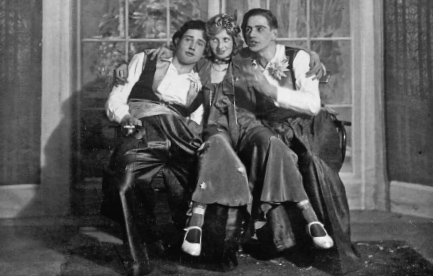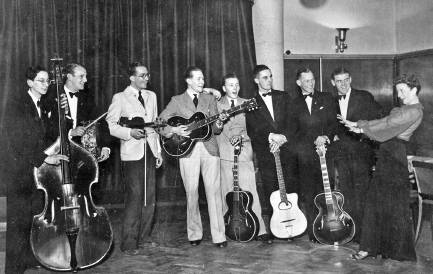

Letters
IN 1994, FOURTEEN years after my initial conversation with my grandmother and ten years after my meeting with my second cousin, I received a call from a stranger in Naarden. It was 7:00 p.m. on a Wednesday, and I’d just arrived home from work. The man sounded excited, and I couldn’t figure out what he was talking about. Perhaps he’d dialed the wrong number, I thought. But after a brief exchange it became clear that I was the person he was looking for. He had found some old letters written by a woman who shared my surname. He asked if I was related to a woman named Rosie. I jumped to my feet. Now I was the one who was excited. This was important—maybe even the key to learning more about my family.
We arranged to meet that same evening, and I jumped into the car and headed for Naarden. The whole ride there I wondered about the letters. What would they have to say? Would they provide new information?
Two hours later I rang the bell at the address provided, and a man of about fifty-five opened the door and ushered me inside. In the living room he introduced me to his wife, who offered coffee, and as she was pouring it they came immediately to the point, telling me it wasn’t easy to find me. They had called other people asking if they were Rosie’s family, but I was the first to say yes.
As members of their local church, they volunteered to visit elderly people in a nearby nursing home. That’s how they got to know Mrs. Coljee. She had no family or friends, and the other people in the home found her grouchy and didn’t get to know her. They visited her for several years. After her death the manager of the nursing home asked them to clear out her room, and to their surprise they found some letters in a desk drawer. They handed me the letters.
As we poured a second cup of coffee, I told them about my quest for information about my family’s past. I asked what the letters contained.
“We’ve read them and they left quite an impression. It was moving to read Rosie’s letters and to experience a little of her daily life. It was quite extraordinary for us.”
We continued to talk as I thumbed through the letters. They were written during the war on an almost weekly basis from Camp Westerbork and later from Camp Vught. How could that be? I had always been led to believe that Aunt Rosie lived in Sweden during the war. Wasn’t she married to a Swede?
Besides letters, the bundle contained other documents such as money orders, proofs of delivery, and a few messages dictated at Rosie’s request. I found short letters from my grandparents, from a certain Kees van Meteren, mailed in Dessau, Germany, where he apparently worked for the Germans in the aircraft factories.
There was also a photo album, which we went through together. One of the pages had a photo of Mrs. Coljee’s brother, proud in his SS uniform, killed at Stalingrad, and another brother in a Wehrmacht uniform, who disappeared on the eastern front. The same page had a photo of Rosie with her parents and brother, my father. For me this single page symbolized the tragedy of the war.
A letter to the Coljees, written on Rosie’s behalf:
As you may already have heard, parcels are no longer being accepted in Vught. I’m just letting you know, so that you won’t send any, otherwise their contents will be distributed among the SS.
You may be surprised at how I managed to get your address. Let me tell you how this works.
I am a driver and I deliver to Vught where I spoke with Rosie Glaser. She asked me to write to you to ask to send a parcel to her. Please give it to me before Tuesday evening and I will bring it with me to Vught on Wednesday. My address is Hemonystraat 28, third floor, Amsterdam (South)
A. G. de Bruyn
And Rosie Glaser sends her warm regards
Rosie at eighteen, 1932
Mrs. Coljee’s brothers died and so did Rosie’s parents, my grandparents. There were no winners, only losers.
It was past midnight when I left.
In the days that followed I read every item, sometimes several times over. Most of the letters were uncensored. I also did some supplementary reading on the camps during the war: Presser’s De Ondergang and books by camp detainees such as Gerard Durlacher, Etty Hillesum, and Rob Cohen. The books and the letters combined gave me a clear impression of what it must have been like for Rosie in the camps. It was like walking into a different world, and it continued to amaze me that only one generation stood between me and these events.

Rosie at carnival with Wim and Franz, 1933
Rosie in Maastricht, 1934
I was also struck by the buoyant tone of Rosie’s letters. She had every reason to complain, indeed many people did, but there was no trace of self-pity in her missives. Instead, she tried time and again to gain control over her own life, to improve her situation, and to enjoy what she could.
Other sources confirmed some of the things revealed in Rosie’s letter. In her book Schroeiplekken (Scorch Marks), Carla van Lier offered a portrait of life in Camp Vught that referenced Rosie. Writing about the many suspicions and rumors that circulated in the camp she speculated: “How was Rosie able to talk about so many established facts that were later confirmed?”

Rosie with musicians, November 1940
The couple who discovered Mrs. Coljee’s letters later wrote me a letter offering a further glimpse of Rosie: “During the summer holidays we met a woman who told us she also worked on the Philips Command. She knew Rosie well, and informed us that she sang and danced and was very beautiful.”
After seven months in Vught, Rosie left on September 10, 1943. She was working for the Philips Command at the time. The reason behind her sudden departure wasn’t clear. Had she been given too much authority? Had she overplayed her hand? Was she being punished for something? Or was she simply deported with other Jewish women? The letters said nothing about it.
I made copies of the material for my brothers and sister, and when we got together for a birthday we talked about Rosie as a family for the first time. But we didn’t dwell on the subject, and the atmosphere was absent the kind of curious enthusiasm one might expect. My sister and one of my brothers were clearly troubled by all the new information. They found it difficult to digest.
I also made copies of some of my grandparents’ shorter letters for my father. I didn’t copy Rosie’s letters, aware that they’d lost touch and afraid to open old wounds. My mother had told me that my father had severed ties with Rosie because he felt she had been reckless when she was supposed to be in hiding, wandering around all over the place with false identity papers. He thought she had not paid enough attention to the risks involved and that her behavior had ultimately led to their arrest. In his eyes, Rosie’s recklessness was to blame for their mother’s death. Based on the letters, I formed a different opinion, but I decided not to bother him with it. He’d closed the door on the past, and I intended to respect that. Nonetheless, I told him that it saddened me that he and his sister were no longer in touch, especially since they both had the good fortune to survive the war. It didn’t make the slightest difference, and I hadn’t expected it to, but I needed to get it off my chest.
Then it was Christmas Eve. I figured our three daughters, who were in their twenties, were old enough to hear my story. That evening I told them for the first time about our Jewish roots, about the fate of the Glaser family, and about their great-aunt Rosie.